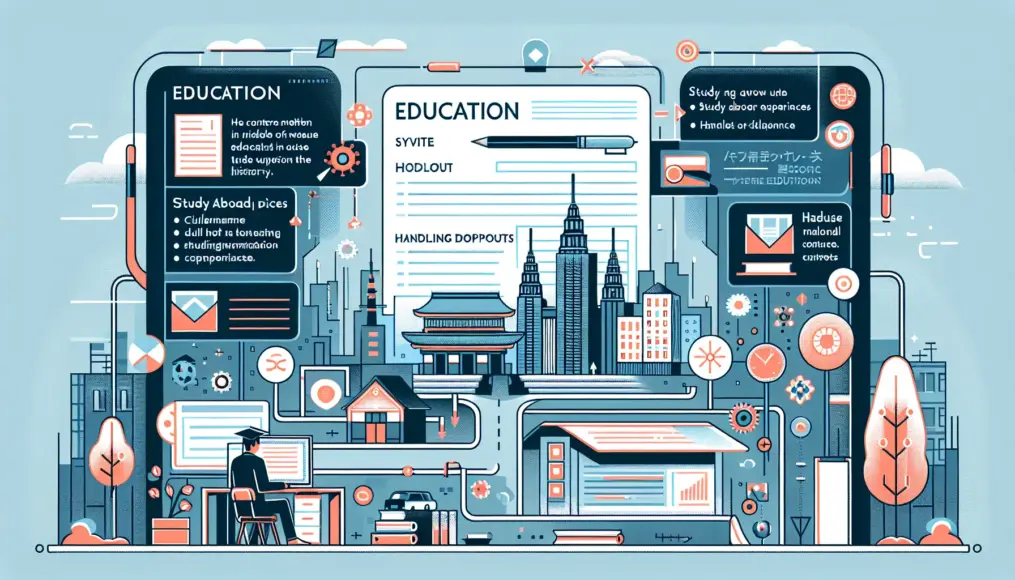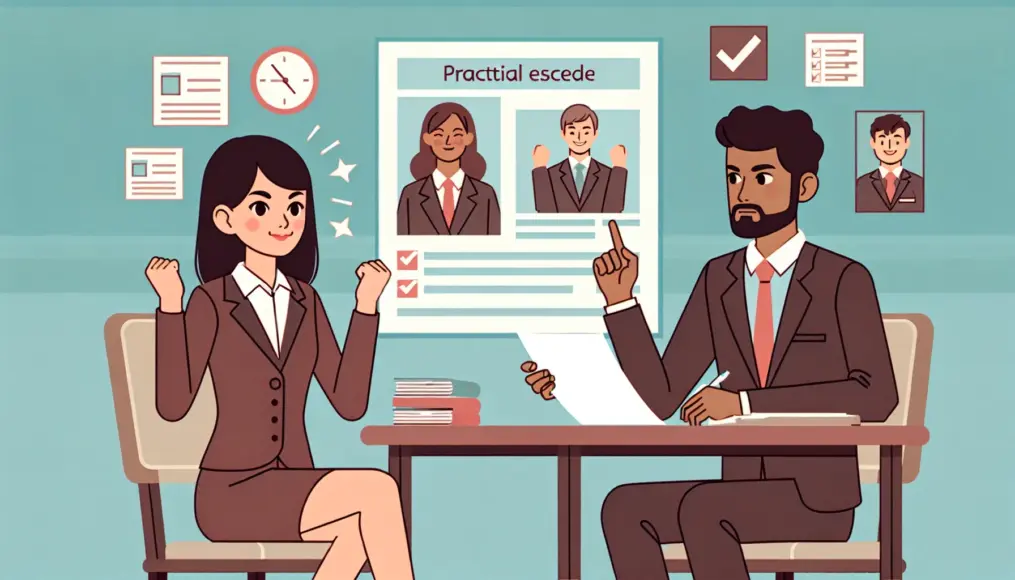Job interviews for mid-career positions are a crucial step in your professional journey. However, figuring out what questions to ask during your conversation with the interviewer can sometimes be daunting. It’s important to remember that the questions you pose not only serve to showcase your qualifications but also help you gauge whether the company is the right fit for you. In this guide, we’ll explore essential questions to ask during your interview and tips for effective follow-up inquiries, setting you on the path to success.
By learning how to draw out your strengths through questions and assess whether the company culture aligns with your values, you can navigate the interview process more effectively. With thorough preparation, you’ll be ready to approach the interview with confidence.
- Understanding the Importance of Questions in Mid-Career Interviews
- Examples of Questions to Highlight Your Strengths
- How to Make a Positive Impression with Follow-Up Questions
The Importance of Questions in Job Interviews
When it comes to mid-career job interviews, questions play a crucial role. Not only do candidates showcase their strengths and experiences, but employers also ask questions to assess the candidates’ fit and values. By engaging in this Q&A, both parties can foster meaningful communication that enhances their understanding of each other.
Interviewers aim to gauge how well a candidate might align with the company culture through their questions. Therefore, the types of questions asked can significantly impact the outcome of the interview. Let’s explore how to approach this aspect thoughtfully.
Why Questions Matter
Questions are essential because they elevate the quality of communication during an interview. When candidates ask questions, they have the opportunity to express their thoughts and values, while interviewers gain insights into their reactions. This mutual exchange fosters deeper understanding and can positively influence the interview’s outcome.
Additionally, questions can prompt candidates to recognize their own strengths and suitability for the role. This means that interviewers pay close attention to the questions candidates ask, using the information gathered to evaluate their fit for the position.
- Questions play a vital role in mid-career interviews
- They deepen mutual understanding
- They can help reveal candidates’ strengths
What Interviewers Are Looking For
Interviewers seek more than just a candidate’s skills and experiences. They also place significant emphasis on cultural fit and teamwork abilities. Through various questions, they aim to determine how candidates can contribute to the company.
Moreover, interviewers evaluate candidates’ communication skills and problem-solving abilities. This assessment helps them gauge how well candidates can adapt to real-world tasks. Understanding a candidate’s personality and depth of thought through their responses is thus a critical aspect of the interview process.
For those interested in understanding the significance of questions in interviews, I recommend checking out this article, “Mastering Interview Questions for Job Success!.” It provides valuable insights on effective ways to respond to common questions and highlights the importance of asking thoughtful questions in return, making it a great resource for interview preparation.
- Interviewers seek not only skills and experience but also cultural fit
- Communication and problem-solving skills are also evaluated
- Questions reveal candidates’ personalities and thought processes
Essential Questions to Ask in an Interview
When it comes to mid-career hiring interviews, the questions you choose to ask are crucial. Interviewers aim to extract meaningful information that helps them evaluate a candidate’s skills and suitability for the role. Particularly, questions designed to uncover a candidate’s strengths and assess their fit within the company culture can significantly impact the outcome of the interview. In this section, we’ll explore the essential questions that should be asked during the interview process.
Questions aimed at understanding a candidate’s strengths provide them with the chance to articulate their self-awareness and showcase their experiences through anecdotes. Additionally, inquiries about the company culture are vital in determining how well the candidate aligns with the organization. Let’s dive into what types of questions can be most effective.
Questions to Uncover Candidate Strengths
To grasp a candidate’s strengths, it’s effective to ask about specific experiences and achievements. For instance, asking, “What’s the achievement you’re most proud of in your career so far?” allows candidates to discuss their skills and accomplishments in detail. Such questions help candidates clearly demonstrate their strengths and values, enabling interviewers to make informed decisions based on that information.
Another valuable question is, “How did you overcome a challenging situation?” This type of inquiry helps assess a candidate’s problem-solving abilities and resilience under pressure. By learning about their experiences, interviewers can better understand the unique value the candidate could bring to the team.
- Asking specific questions about achievements is effective.
- Questions that evaluate problem-solving skills are also crucial.
- Drawing out a candidate’s strengths allows for more informed decisions.
Questions to Assess Cultural Fit
Questions that gauge whether a candidate fits the company culture are essential for understanding their potential longevity within the organization. For example, asking, “What kind of workplace atmosphere do you consider ideal?” provides insights into a candidate’s values and the environment they thrive in. This information serves as a key indicator of whether the company culture aligns with the candidate.
Furthermore, asking, “Do you prefer working in a team or independently?” is also effective. This question helps interviewers understand the candidate’s preferred working style, allowing them to assess compatibility with the company’s approach to work. By doing so, interviewers can better evaluate how adaptable the candidate might be within the organization.
- Questions to determine cultural fit are important.
- Understanding a candidate’s ideal work environment reveals their values.
- Knowing a candidate’s preferred work style helps assess adaptability.
Tips for Asking Thoughtful Questions and Examples of Effective Queries
During job interviews, candidates are often expected to ask thoughtful questions. This reverse questioning not only helps applicants deepen their understanding but also serves as a crucial opportunity to leave a positive impression on the interviewer. By asking insightful questions about the company culture and work environment, candidates can assess whether they would be a good fit for the organization. In this section, we’ll explore tips for effective reverse questioning and provide examples of impactful questions.
Reverse questions are not just about throwing out random inquiries; they are a fantastic way to demonstrate your interest and enthusiasm for the company. By asking the right questions, you can impress the interviewer and potentially improve your chances of a favorable outcome. Let’s delve into what kinds of questions can be most effective.
Making a Lasting Impression with Your Questions
To stand out with your reverse questions, it’s essential to do your homework about the company beforehand. Understanding the company’s vision and recent projects allows you to formulate specific questions that showcase your seriousness and enthusiasm. For instance, asking, “I’m interested in your recent projects; what specific role would I be expected to play?” is a great way to express interest in the company.
Moreover, it’s important to consider how you can contribute to the organization. Questions like, “What skills can I expect to develop after joining?” can help you assess whether the environment will foster your growth.
- Research the company in advance
- Ask specific questions to demonstrate your seriousness
- Think about questions that relate to your personal growth
Examples of Specific Questions
Here are several specific questions you can use during your reverse questioning. These inquiries can help you gain insights into the company culture and team dynamics. For instance, asking, “What values are most important to this team?” is very effective for understanding the company culture.
Additionally, asking, “What skills are necessary for success in your organization?” is a great way to grasp the abilities that are valued. Lastly, inquiring, “What upcoming projects are you particularly excited about?” can serve as a great conversation starter with the interviewer.
If you’re curious about reverse questioning during interviews, check out this article: “What to Expect in Final Job Interviews! Preparation Tips for Success.” This piece details the intent behind questions asked in final interviews and how to prepare effective reverse questions for a successful outcome. Be sure to take a look!
- “What values are most important to this team?”
- “What skills are necessary for success in your organization?”
- “What upcoming projects are you particularly excited about?”
Understanding the Interviewer’s Mindset
When it comes to job interviews for mid-career positions, grasping what the interviewer is thinking can be the key to success. Interviewers assess not only the applicant’s skills and experience but also their fit within the company culture and their ability to work as part of a team. As a result, the questions they ask and their reactions often reflect their expectations and concerns about the candidate. In this section, we will explore the key points that interviewers focus on and how to leverage psychological insights for a successful interview.
By understanding the interviewer’s mindset, candidates can better articulate how to present themselves. Additionally, being aware of the interviewer’s perspective during the conversation can lead to more effective communication, allowing candidates to steer the interview in their favor.
Key Points Interviewers Look For
Interviewers pay attention to a variety of factors, but there are some key areas they focus on particularly. First and foremost, applicants’ technical expertise and skills are fundamental evaluation criteria. However, it doesn’t stop there; communication skills and the ability to collaborate with a team are also heavily weighted.
Moreover, to assess how well a candidate aligns with the company culture, interviewers often pose questions related to values and work styles. The candidate’s responses to these questions provide valuable insights for the interviewer. By honestly conveying their values, candidates can build trust with the interviewer.
- Interviewers prioritize technical knowledge and skills
- Communication abilities and teamwork are also evaluated
- Questions assessing cultural fit are common
Achieving Success Through Psychological Approaches
To ace the interview, adopting a psychological approach can be highly effective. First and foremost, it’s important for candidates to come into the interview in a relaxed state. When feeling nervous, natural communication can become a challenge. Taking deep breaths and calming the mind can help candidates perform at their best.
Additionally, providing well-thought-out responses to the interviewer’s questions is crucial. By sharing specific anecdotes from their experience, candidates can enhance their persuasiveness. Clearly conveying the information the interviewer seeks can help highlight the applicant’s strengths.
While understanding the interviewer’s mindset is essential, utilizing reverse questions can also be a key to success. If you’re interested in this topic, check out this article on “Leveraging Reverse Questions During First Interviews: Tips for Job Success” to learn how to effectively showcase yourself during an interview.
- It’s important to approach the interview in a relaxed state
- Use techniques like deep breathing to calm your nerves
- Respond with specific examples to strengthen your answers
Summary
Job interviews for mid-career positions are a crucial step for candidates, and proper preparation is key to success. It’s essential to effectively showcase your strengths and experiences in response to the interviewer’s questions. Additionally, asking insightful questions can demonstrate your genuine interest and enthusiasm for the company. By understanding the interviewer’s mindset and conveying the necessary information clearly, you can achieve better results.
Moreover, maintaining a relaxed demeanor and engaging in natural communication can highlight your appeal as a candidate. Asking questions that align with the company culture offers a chance to express your own values as well. Being well-prepared and approaching the interview with confidence is vital.
- It’s important to highlight your strengths and experiences.
- Demonstrating enthusiasm for the company through thoughtful questions is essential.
- Understanding the interviewer’s perspective and striving for natural communication is key.
Take these insights into account for a successful interview. We’d love to hear about your experiences and thoughts in the comments!



Comment